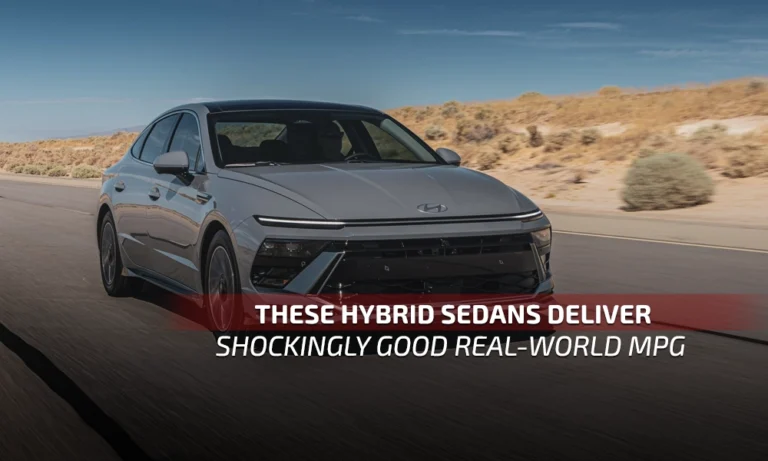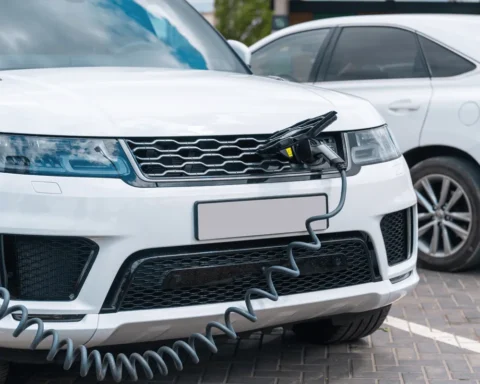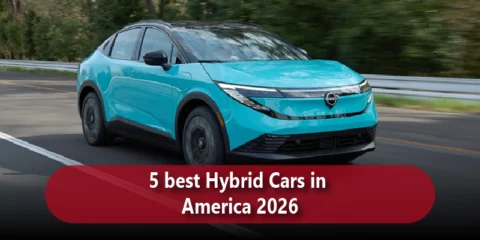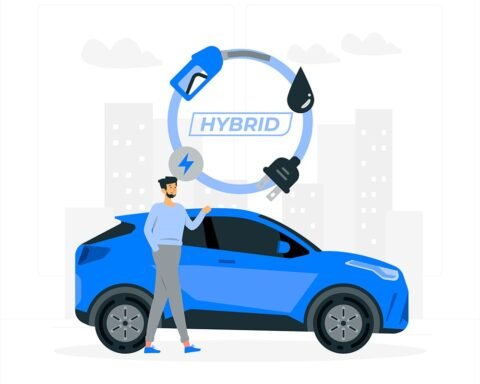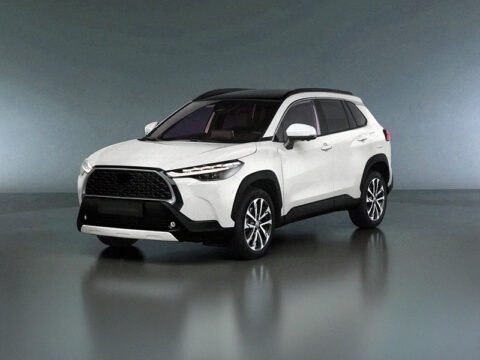Hybrid sedans are promoted for their high MPG figures, yet real-world performance can vary greatly from EPA or WLTP numbers.
In this guide, we’ll break down everyday fuel economy from actual owner reports and expert testing.
That way you won’t have to rely on lab figures—you’ll have real data you can trust before booking a test drive.
Toyota Corolla Hybrid: Reliable 50–60 MPGs on the Road
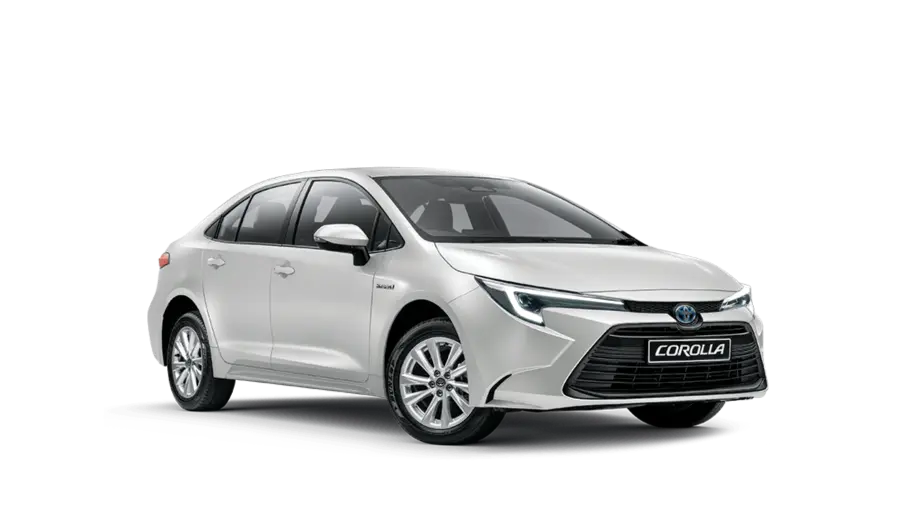
Toyota continues to lead the hybrid pack with its Corolla, regularly posting 50–60 MPG combined in owner reports.
During warmer months or highway cruising, some users hit 63 MPG over long trips.
Auto Express long-term testing returned around 53 MPG, making it one of the most fuel-efficient non-hybrid vehicles on British roads.
Honda Civic Hybrid: 45–56 MPG, Driven Hard and Soft
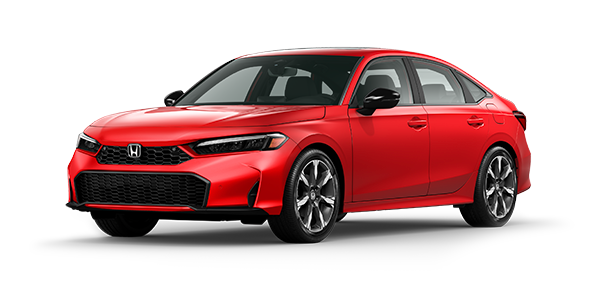
The new 2025 Civic Hybrid was awarded Edmunds’ Top Rated Car with a real-world average around 48 MPG—often matching or exceeding its EPA combined rating of 49 MPG.
Cars.com recorded 52 MPG after a structured 200-mile test.
Enthusiast communities report wide variation—31 MPG around cold highway miles, up to 70 MPG in gentle city runs.
One highly detailed user averaged 56 MPG over 5,000 miles when driving mostly in eco mode with a mix of highway and city.
Toyota Camry Hybrid & Prius: Consistent Efficiency over Comfort

Larger hybrids like the Camry Hybrid usually average around 42–44 MPGs in real-world conditions.
These are often backed by consumer testing showing stable economy across mixed driving scenarios.
The iconic Prius still posts real-world fuel economy near 52–57 MPG depending on model and trim, with many user reports hitting 58 MPG on longer trips.
Lexus ES 300h / Accord Hybrid: Near-Luxury Efficiency
If you want size and comfort plus decent MPG, look at the Lexus ES 300h (43 MPG combined) or Honda Accord Hybrid (44 MPG)—both deliver respectable real-world performance while offering premium cabin space and ride quality.

Why Actual MPG Can Differ from Official Ratings
Lab testing environments (WLTP, EPA, NEDC) assume ideal weather, smooth roads, and minimal load. Real driving introduces:
- Start-stop urban conditions
- Varying temperatures (rapid drops in city economy below 5 °C)
- Use of air-conditioning or heating
- Tire size, road surface, and driving style
Consumer Reports has found diesel hybrids can fall short of lab figures by upwards of 20%.
Best Ways to Improve Hybrid Fuel Economy
- Use Eco or Normal mode, and avoid Sport unless necessary
- Keep speeds moderate—fuel economy often drops rapidly above 65 mph
- Light acceleration and coasting when possible
- Proper tire pressure maintenance, avoid winter compound tires unless needed.
- Monitor battery charge; shifting between EV-to-engine transitions helps maximize regen efficiency.
Real‑World MPG Averages
| Model | Official WLTP/EPA | Typical Real-World MPG |
| Toyota Corolla Hybrid | ~57–62 | 50–60 (highway upto 63) |
| Honda Civic Hybrid (2025) | 48–49 combined | 45–56 (varies with conditions) |
| Toyota Camry Hybrid | ~46–48 | ~42–44 |
| Toyota Prius Hybrid | ~52–58 | ~52–57 |
| Lexus ES 300h / Accord | ~48–50 | ~43–44 |
FAQs
Lab ratings assume ideal climate, no traffic, and optimal load.
In reality, cold weather, highway speeds above 65 mph, heavy loads, and frequent starts/stops reduce efficiency by up to 15–20% in hybrids.
Toyota Corolla Hybrid consistently delivers around 60 MPG on highways in real driving conditions if driven patiently.
Combined figures average 50 MPG, making it one of the most efficient sedans around.
Cold weather significantly reduces electric-assist effectiveness.
Owners in northern regions report drops from mid‑40s MPG to 40 or lower, even in Eco mode.
Warm-weather runs show far higher numbers.
Driving gently—avoiding fast starts, coasting when possible, and staying in Eco mode—can improve fuel efficiency by 5–10 MPG.
Aggressive turbo use, high-speed cruising, and Sport mode often erode gains.
Yes—models like Camry Hybrid or Lexus ES 300h still achieve 43–44 MPG combined, offering a spacious, comfortable ride while costing significantly less to fuel than comparable petrol-only sedans.
Yes—models like Camry Hybrid or Lexus ES 300h still achieve 43–44 MPG combined, offering a spacious, comfortable ride while costing significantly less to fuel than comparable petrol-only sedans.
Hybrids Are The Mileage Champions!
As I mentioned in my last blog, I feel hybrids are the best option for the majority of people out there.
Hybrids strike the perfect balance between performance and range!
I remember reading an article where the CEO of Toyota said that the future is Hybrid tech and not EV.
I would love to research and discuss on the effectiveness of EV and Hybrids in some time.
Meanwhile, as we are talking about hybrids, I feel they’ve come a long way and in today’s day and age, are the perfect tools for the modern family.


